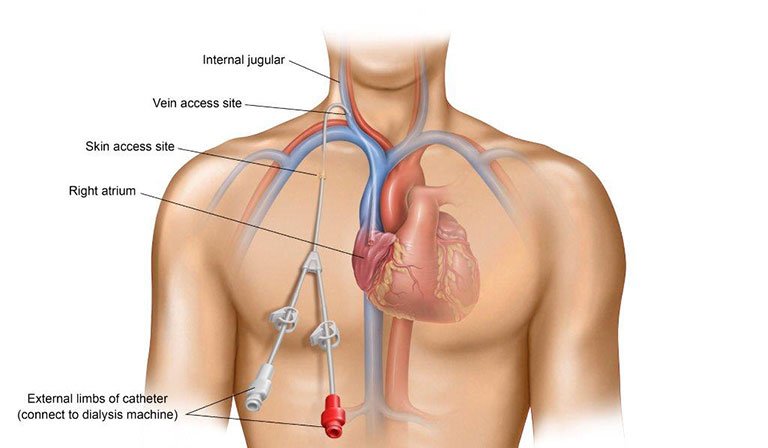Dialysis Catheter Insertion in Nagpur

Dialysis Catheter Insertion in Nagpur – Dr. Rohit Badge | Kidney Healthcare Clinic
Kidneys play a crucial role in maintaining body balance by filtering toxins, regulating fluid levels, and managing electrolytes. However, when they fail to perform these vital functions, dialysis becomes essential. For dialysis to work effectively, proper vascular access is required, which is achieved through a dialysis catheter insertion. At Dr. Rohit Badge’s Kidney Healthcare Clinic in Nagpur, patients receive safe, accurate, and affordable dialysis catheter insertion under expert supervision. Moreover, Dr. Badge ensures that each procedure follows strict safety standards, minimizes discomfort, and enhances treatment outcomes through advanced medical techniques.
Understanding Dialysis Catheter Insertion
A dialysis catheter is a soft, flexible tube inserted into a large vein, typically in the neck or chest, to provide access for hemodialysis. It enables blood to flow in and out efficiently during dialysis sessions. However, this procedure demands precision and must be performed by a skilled nephrologist. Therefore, Dr. Rohit Badge specializes in dialysis catheter insertion using modern imaging guidance and sterile techniques to ensure safety and accuracy. Furthermore, his patient-centered approach reduces risk, promotes comfort, and supports smoother dialysis performance. As a result, patients experience reliable access and improved dialysis efficiency.
When Dialysis Catheter Insertion Becomes Necessary
Dialysis catheter insertion becomes necessary when:
- A patient needs immediate hemodialysis treatment
- Permanent vascular access, such as a fistula or graft, is not yet ready
- Short-term dialysis support is required in acute kidney failure
- Long-term dialysis must continue until another access option is available
Importance of Expert Supervision
Dialysis catheter insertion requires medical precision and consistent monitoring to prevent complications. Therefore, expert supervision by an experienced nephrologist ensures accurate catheter placement and optimal performance. Dr. Rohit Badge personally oversees each procedure to guarantee patient safety and comfort. Furthermore, his clinic provides complete post-procedure care, including catheter maintenance and hygiene education, to prevent infection. Hence, patients enjoy continuous, effective dialysis and long-term treatment success.
Advanced and Affordable Dialysis Catheter Services in Nagpur
At Dr. Rohit Badge’s Kidney Healthcare Clinic, every dialysis catheter insertion is performed using state-of-the-art equipment and modern techniques. The clinic maintains affordability without compromising on quality, allowing patients from all backgrounds to access expert nephrology care. Furthermore, the environment remains completely sterile, and all procedures follow global safety standards. As a result, patients experience smooth recovery and reliable vascular access for dialysis. Additionally, Dr. Badge’s compassionate and detail-oriented care ensures confidence throughout the treatment process.
Why Choose Dr. Rohit Badge – Dialysis Catheter Specialist in Nagpur
Choosing a trusted and skilled nephrologist is vital for dialysis success. Dr. Rohit Badge, renowned for his expertise and compassionate care, provides exceptional dialysis catheter services in Nagpur. Moreover, his clinic emphasizes transparency in procedure explanation, cost structure, and follow-up care. Additionally, patients receive continuous support through regular check-ups, maintenance guidance, and preventive education. Consequently, this combination of precision, affordability, and empathy makes Dr. Rohit Badge one of the most respected kidney specialists in Nagpur.
Conditions Treated by Dr. Rohit Badge
- Chronic Kidney Disease (CKD)
- Kidney Failure and Dialysis Care
- Urinary Tract Infections (UTI)
- Diabetic and Hypertensive Nephropathy
- Kidney Stones and Blockages
- Electrolyte and Metabolic Imbalance
Conclusion
In conclusion, dialysis catheter insertion plays a crucial role in ensuring effective and safe dialysis for patients with kidney failure. At Dr. Rohit Badge’s Kidney Healthcare Clinic in Nagpur, patients receive expert care that combines medical precision, advanced technology, and compassion. Furthermore, with affordable pricing, personalized treatment, and constant medical guidance, Dr. Rohit Badge guarantees both comfort and long-term kidney health. Ultimately, timely consultation and professional supervision help patients maintain stability, regain confidence, and live a balanced, healthier life under his trusted care.
